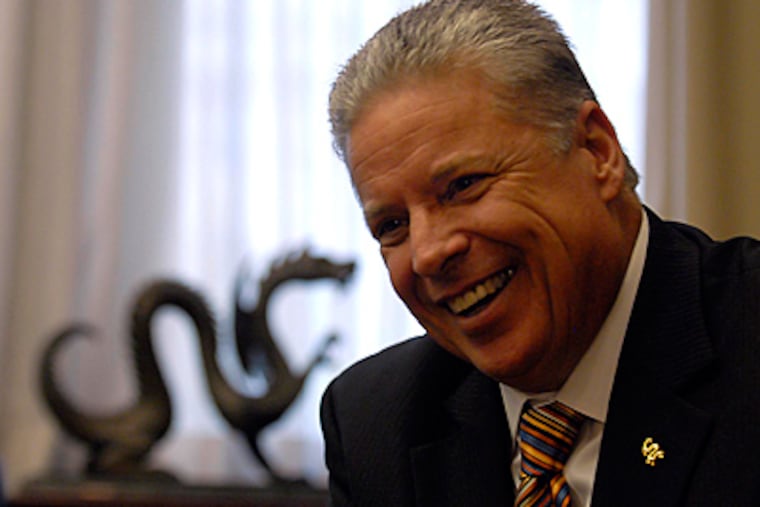Constantine Papadakis, 63, Drexel University president, dies
Constantine "Taki" Papadakis, 63, who oversaw a major expansion of Drexel University in his 13 years as its president, died last night from pulmonary complications, the university announced this morning.

Constantine "Taki" Papadakis, 63, who oversaw a major expansion of Drexel University in his 13 years as its president, died last night from pulmonary complications, the university announced this morning.
Mr Papadakis, who was in remission from lung cancer, went on medical leave Thursday. His cancer was diagnosed on a business trip after sustaining an injury and getting a chest x-ray more than a year ago.
"This is a day of profound mourning for the entire Drexel community of students, faculty, staff and administrators, our alumni worldwide and friends everywhere," said Richard Greenawalt, president of the university's Board of Trustees. "Our deepest condolences go out to the Papadakis family."
Mayor Nutter hailed Mr. Papadakis as an "incredible visionary" who had "more of a hands on impact" that any other university president he could recall.
"Taki was bigger than life itself," said Manny Stamatakis, Founder and CEO of Capital Management Enterprises and a close friend of Papadakis. "He was a renaissance man, a visionary. He could see opportunities were other people saw risk. And he had the courage to undertake difficult initiatives and make them successful."
A Greek-born engineer and former Bechtel Corp. executive, Mr. Papadakis was known for starting his days at 6 a.m. and staying after everyone else left.
In the days leading up to his leave, he worked from the hospital while he underwent treatment. He and his family then decided it was time to focus on recovery.
Mr. Papadakis had led the 20,700-student university in West Philadelphia since 1995, making changes swiftly and defying the often slow-paced decision-making process common in academia.
In his tenure, he transformed Drexel from a struggling engineering school to a strong institution with a law school and a medical school, which he built on the remains of the MCP Hahnemann School of Medicine.
He became well known for running the university like a well-oiled business.
He also established several new majors at the school during his tenure, and in 2002 began Drexel Online, a distance-learning program.
Enrollment has more than doubled, and applications are up dramatically this year, even during the economic downturn - likely driven in part by the school's co-op program, which allows students to earn money while interning.
The campus has added many new buildings since his arrival, including the law school, several new residence halls, a student activities center, an art gallery, a business center and the I.M Pei-designed Edmund D. Bossone Research Enterprise Center.
In August 2008, U.S. News and World Report ranked the school sixth in its "up and coming" national universities category.
Mr. Papadakis was the prime move behind Drexel's most recent plans to expand to the West Coast and draw on a new, growing market. Whether plans to open a four-year campus in California will proceed in earnest is uncertain.
Drexel earlier this year started a graduate school in the Sacramento area.
Mr. Papadakis also played an active role the city's business community. In 2004, he helped create Select Greater Philadelphia, an affiliate of the regional chamber of commerce charged with selling the area to outside firms.
He opened Drexel and his home to his fellow business and higher education community leaders as well as executives of new companies that Select had helped to bring to the region.
A year ago, he received the Greater Philadelphia Chamber of Commerce's William Penn award, given to business executives for outstanding contributions to the region.
Mr. Papadakis had his critics, who were concerned that his business focus came at the expense of some academic initiatives.
He was one of the highest paid presidents in the area, collecting more than $1 million in fiscal 2007, the most recent year for which figures were available.
The son of a doctor, Mr. Papadakis went to engineering school in Greece before graduate studies in engineering at the University of Cincinnati and a doctorate degree at the University of Michigan.
C.R. "Chuck" Pennoni, past chairman of the board of trustees and until 2006 a member, is serving as interim president. Pennoni, who heads Pennoni Associates, an engineering design firm he founded in 1966, had a previous stint as Drexel interim president in 1994 and 1995, when former president Richard Breslin left. He helped recruit Mr. Papadakis at that time.
Pennoni, a 1963 Drexel graduate and benefactor and namesake of its honors college, is doing the interim job without compensation.
Mr. Papadakis is survived his his wife of 39 years, Eliana, and daughter Maria, a 2008 Drexel graduate.
A church service will be held at noon on April 14 at St. Luke Greek Orthodox Church in Broomall, Pa. In lieu of flowers, contributions can be made to the "Constantine Papadakis Fund at Drexel University," Drexel University, 3141 Chestnut Street, Philadelphia, Pa. 19104.